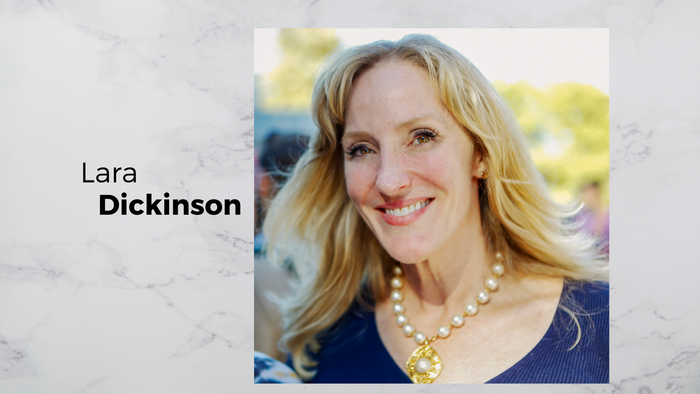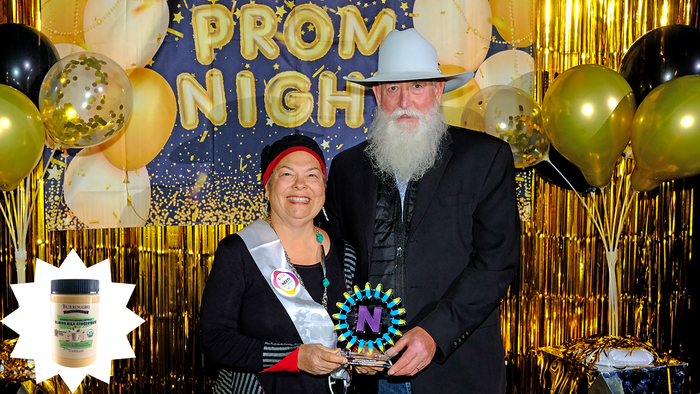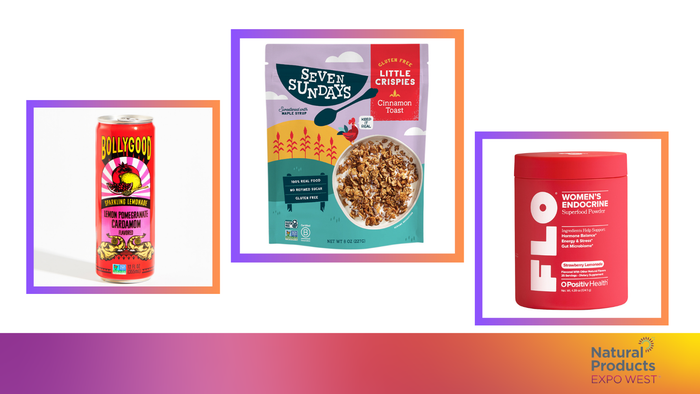
Discover how one food service provider delivers inclusive dining options—global flavors as well as special dietary needs—to satisfy today's diverse college students.
February 17, 2025
At a Glance
- Students find comfort in authentic global flavors such as birria tacos and halal meals on Chartwells' menus.
- Prioritizing safety, Chartwells provides allergen-free food stations and gluten-free pantries for students.
- With an eye on the environment, Chartwells works to cut emissions, reduce food waste and offer 'low-carbon' meals.
Even as a number of companies renege on their recently implemented DEI commitments, Chartwells Higher Education is staying true to inclusivity, one of the core tenets tied to its founding nearly 30 years ago.
“It has always been on top of mind, and over the years, we've built some excellent programs to support that,” says Joe Labombarda, senior vice president of culinary at Chartwells, which provides contract food services to 300 college campuses throughout the United States. “It's our responsibility to make our customers, our students, feel happy and comfortable and include them in the food culture.”
That’s because food, Chartwells believes, serves as one of the best ways to bring people together, and foster connections and community. As such, the North Carolina-based company caters to a range of dietary needs—from accommodating food allergies and religious requirements to keeping pace with generational expectations around sourcing and sustainability, and everything in between. And Chartwells has even more business model tweaks in mind with Gen Alpha soon to replace Gen Z inside the ivory towers. It’s all about helping every student to feel seen through the food they eat at school.
“Everyone on campus is important and has a place, and we celebrate all differences and all similarities,” Labombarda says. “They’re at home, and we want them to be their best, genuine selves.”
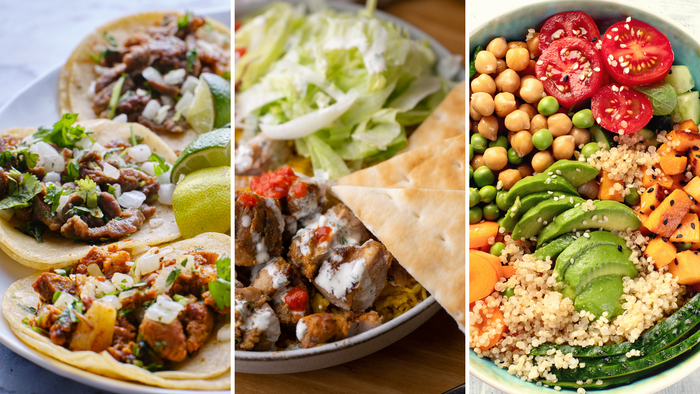
Chartwells creates inclusive menus for all students, such as birria tacos, left, a halal chicken dish and a protein-rich vegan salad. Credit: Canva
Providing comfort food for international students
For Chartwells, that means taking into account the needs of the entire campus population; a tall order perhaps, but one the company is fulfilling. Take, as just some examples, its inclusion of low-impact meals; protein-rich, vegan and international options; and kosher and halal kitchens. To that last point, the demand for halal ingredients and recipes alone has “skyrocketed” over the past seven years, Labombarda says, noting that Chartwells now serves thousands of halal meals each day. At the same time, the company continues to expand its offerings each year as more and more students hail from regions including Asia, Latin America and the Middle East. Exclusively American fare won’t cut it for these populations. Rather, “authentic flavors from home are now comfort foods,” says Labombarda, and Chartwells, largely through its United Table initiative, delivers those.
“We've built a program celebrating different cultures’ foods and street foods, and it’s rotating. So, you might have birria tacos one day or Korean fried chicken on another. [Our students] want those authentic, delicious flavors from all over the world.”
Keeping food allergies, special diets top-of-mind
Consider, too, that Chartwells doesn’t shy away from serving students with food allergies. Acting on its inclusivity roots, Chartwells runs food stations free of the top nine allergens; those menus often feature global cuisines and comfort foods, as well. All are assembled by staff who have been trained on allergy-safe food purchasing, storage, preparation and cooking, Labombarda says. In fact, Chartwells even stocks a dedicated gluten-free pantry so students can make their own simple meals when they like. Chartwells’ overall approach to food allergies gives parents and students alike “peace of mind,” he says, and prevents social isolation.
Indeed, accommodating food allergies has turned into a mainstay for Chartwells. Whether it’s gluten, soy, dairy or another ingredient, food allergies of all kinds are becoming more prevalent, Labombarda says. So, Chartwells has a couple of approaches in mind. First, at the corporate level, its nutritionists will track trends and implement best practices. Second, at the campus level, Chartwells will make sure students know that they have direct—and, when desired, discreet—access to its food experts.
“Our dietitians and chefs have built thousands of relationships with students on our campuses, to the point where many times it’s like, ‘Hey, I'm coming into eat at these times on this day.’ And luckily, we have great people,” Labombarda says. “When you work in the hospitality industry, it's a passion. It’s in our genes to make people feel welcome and to feed people. And we want people to be happy and keep them safe.”
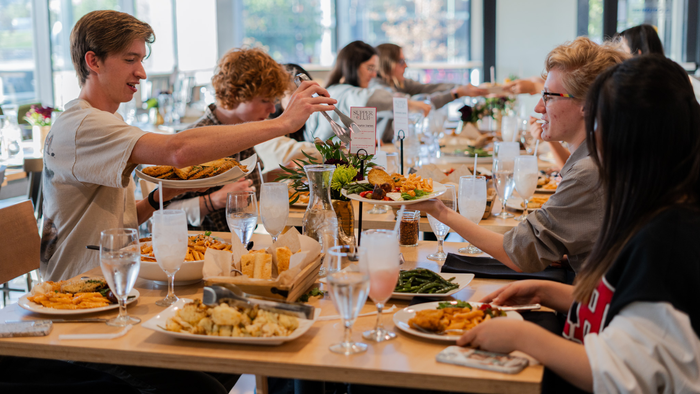
A family-style dinner in a cafeteria setting promotes sampling, sharing and conversation at the evening meal. Credit: Chartwells Higher Education
Considering Gen Alpha's unique experiences
For Chartwells, inclusivity isn’t just about the types and varieties of food on the menu anymore, either. These days, the company also eyes its offerings through the lens of generational awareness.
“Younger Gen Z students, their parents are Gen X, and a lot of Gen Xers feel like they are foodies,” Labombarda says. “They grew up going to supermarkets like Whole Foods or Trader Joe's and understand the difference between good-for-you food—good for your mind and body, and a great food experience. [Gen Z] also grew up with food culture that didn't exist years ago: Celebrity chefs are a thing, and primetime television shows with cooking challenges, and, most importantly, social media. Gen Z's peers post epic food experiences on social, they follow their peers who are foodies, and that plays a big part into the culture.”
It’s not just the quality of food, either. As Gen Alpha—children born since 2010, more or less—starts looking at colleges, Chartwells executives are devising ways to meet students’ expectations around the food-preparation experience. In grade school, Gen Alpha got hit with the global COVID-19 pandemic and its lockdowns that left a “profound effect” on its development, Labombarda says. One of the key impacts to emerge from Gen Alpha’s COVID years was that dinner, more so than other meals, turned into an at-home event.
“The Gen Alpha student became a lot more involved in the family choices,” Labombarda says. “They had a say in what went on the grocery list.” Now, those students want to maintain that same level of interaction with their food as they move into higher education. Chartwells has a plan.
“One thing we’re working on building out right now is a build-your-own Indian street food station,” Labombarda says. “You make yourself a bowl or a naan wrap, and you choose your ingredients with those great, unique, authentic flavors.”
Chartwells further is applying that concept to Latin and Mediterranean cuisines with the overarching goals of giving students the tools to tailor their fare. “Some people like more heat. Some people like less heat. Some people want to go a little bit more plant-forward or have animal protein,” Labombarda says.
Regardless of the food itself, Gen Alpha’s preferences reflect a growing reality: “Customization is, and will be, more and more prevalent,” he says.
In addition to hands-on involvement, Gen Alpha, whose parents are millennials—“and all millennials consider themselves foodies,” says Labombarda—wants meals that are not just healthy but also good for the environment. To that end, Chartwells operates programs with some of its university partners around emissions tracking, reducing food waste and serving low-carbon meals.
And the company’s inclusivity model is evolving more. Right now, Chartwells remains in the early stages of consulting with neuroscience professionals to learn how the company can serve neurodivergent students. This population may struggle with sensory inputs such as loud dining halls and often has specific nutritional needs. Chartwells could end up developing quiet spaces within its dining areas, for instance, and offering low-sodium meal plans; salt can be a trigger for people classed as neurodivergent.
“[W]e’re working with experts to learn more so we can build out the spaces and provide the food so they can be their best selves,” says Labombarda.
Notably, Labombarda predicts that Chartwells’ inclusivity model will start pushing businesses outside of academia to follow suit. As university students graduate and take jobs in the so-called real world, they may literally come to the table expecting the same quality and variety of food they enjoyed in college. Labombarda, for his part, welcomes the opportunity for Chartwells to contribute to the evolution of the food industry as a whole.
“The more people that have [a] need, then, then the more we could demand that partners and vendors provide the ingredients that we need to be successful,” he says.
About the Author
You May Also Like
